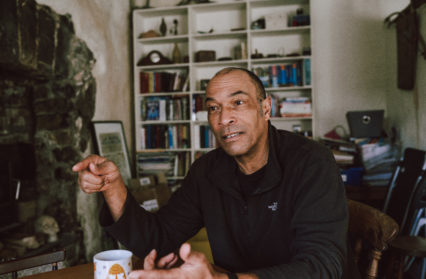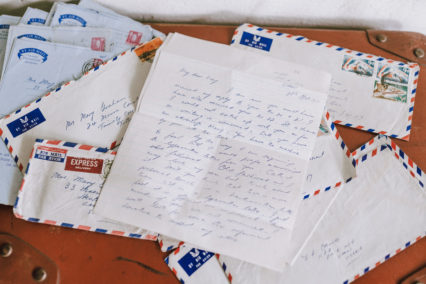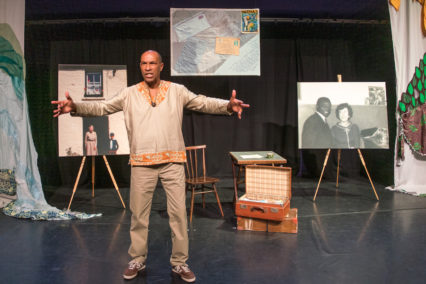Jasmine Okai, Associate Producer of The Gods Are All Here, poses a series of questions to writer Phil Okwedy and director and storyteller, Michael Harvey.
The Gods Are All Here is Welsh storyteller Phil Okwedy’s first solo show to tour nationally across Wales. Producers Adverse Camber – in association with Theatrau Sir Gâr – have joined forces with Phil to share an incredible story that reveals a chance discovery about his own past and family history. The show explores equality, freedom, racism, family and growing up without your birth parents. Through Phil’s amazing ability to weave myth, song, folktales and legends of the African diaspora, with his own astonishing personal story, we unearth his experiences of growing up as a child of dual heritage in the 1960 and ’70s in Wales.
Q&A with storyteller, Phil Okwedy
Jasmine Okai: Give us an overview of the show, The Gods Are All Here, what it means to you, why you wanted to turn this story into a performance, and the steps you took to do that.
Phil Okwedy: The show is my attempt to connect my experience with the heritages of my parents and ancestors. I hope that in sharing it in performance, it resonates with other people’s stories and experience and so makes a larger connection. I began the piece with a lot of free writing, scribbling away in order to try and find the kernel of what I wanted to share and say. When I had that, thanks to a stabilisation grant from Arts Council Wales, I began working online with Michael Harvey as dramaturg, which is really to say that he listened, questioned and provoked while I responded, adapted and reworked until we had something to share over Zoom with an invited audience. The feedback provided saw further radical development and with Adverse Camber supporting and producing the show, it continues to evolve with each performance.
Jasmine Okai: Tell us about the various elements that make up the piece.
Phil Okwedy: There came a time when I felt I should tell myth, only I couldn’t find any myth that resonated with me. That’s when I began thinking about the stories that make up my life, how they weren’t connected and how, if I found the right folktales, the right mythic elements, I might find connections and make my own kind of myth.
Jasmine Okai: You talk about this being ‘a story of now’ – why is it important to tell this story now?
Phil Okwedy: I hope that in weaving together the various elements the story has a contemporary feel and resonance for audiences. That it leads them to consider their own story and to see the points where all our stories connect.
Jasmine Okai: What has it been like to work with the acclaimed storyteller, Michael Harvey as Director, how has he changed your practice and what impact has this had on you?
Phil Okwedy: The experience has deepened my understanding of the art form of storytelling and seen my process continue to evolve. A great strength of storytelling is that each telling is different from the last, and I now feel I can carry the intention to a greater extent, and with more skill into each performance than before.
Jasmine Okai: What legacy do you want The Gods Are All Here to leave?
Phil Okwedy: That’s a big word – legacy – and not one I’m sure I’d naturally use, but I hope that the story resonates in such a way that it inspires others to give voice to their own stories.
Jasmine Okai: What were your hopes for the piece? How has it impacted you?
Phil Okwedy: I’d never consciously made work with theatre, big spaces, in mind before, so I wasn’t clear in my mind that I wanted to do that with this piece. I had previously worked with both folktale and personal story and so wanted to explore that more in order to find some fusion between my own lived experience, and the myths available to me as a person of dual, or ‘jewel’ heritage as my friend, and the show’s designer, Molara Adesigbin, calls it.
Jasmine Okai: Why in the form of storytelling?
Phil Okwedy: I’ve always understood my own life and the life around me in terms of stories. Not written or often not even spoken out loud, but the stories I told, and still tell, in my own head. I think that’s a very human thing to do, perhaps the most human thing to do, and it’s how I find connection with all the disparate parts of myself. So, of all art forms, storytelling seems the most natural way to communicate to me.
Q&A with director, Michael Harvey
Jasmine Okai: In what ways did your storytelling background inform and influence your directing of The Gods Are All Here?
Michael Harvey: Storytelling methods and protocols are the bedrock of how the performance was created. Probably the biggest difference between how I do storytelling and how conventional theatre is made is that we have no script. In performance, the same things happen in the same order to the same people, but the actual words, intention and delivery evolve over time and can be adapted by the storyteller for different audiences and spaces.
Jasmine Okai: What was the first thing that stood out to you when you first heard this story?
Michael Harvey: The letters! It was great to have real life artefacts that the people in the story had created, thought about, written, read and reacted to. Together with the photographs they really brought Phil’s parents, Felix and Mary, into the room and the letters became resonant objects that made the characters more present and, strangely, also helped bring the mythic elements of the story to life.
Jasmine Okai: What do you think The Gods Are All Here says about storytelling as an art form?
Michael Harvey: That it is dynamic, flexible, audience-facing, engaging, provokes conversation, connects human and mythic time, looks the audience directly in the eye, uses the hidden social storytelling and story-making skills we all have to create professional, responsive and relevant performances for many different audiences.
Jasmine Okai: Tell us about your relationship with the piece and how you helped to shape it from its first iteration, into what is now a piece ready for a national tour of Wales.
Michael Harvey: This show was a Covid baby. We spent a long time working on Zoom and did a couple of Zoom previews. I think the length of the process may have helped it bed down into something really solid. The big step-change for me was getting into the rehearsal room in Ffwrnes. It suddenly felt a lot more real and tangible as a piece. We got a clear sense of direction on Zoom but, for me, I needed to be in the room to really feel the resonance and help the work become believable, real and dynamic.
Jasmine Okai: Talk about how you find being the director rather than the storyteller, how does this impact on you and your relationship with the story, how is the journey different for you?
Michael Harvey: When I am directing, I aim to make an environment where the good accidents can happen rather than aim for anything pre-determined. The agency needs to remain with the storyteller. My job is to make their life interestingly difficult so that we discover layers of meaning and ways of playing we didn’t anticipate.
Jasmine Okai: How will working on The Gods Are All Here impact on you as a storyteller – what impact influence has Phil and/or the story had on you?
Michael Harvey: This show has shown me that if someone has a great story and good storytelling chops facilitating their ambition and talent is practically obligatory.
The Gods Are All Here is currently on tour, find date and ticket details here.














